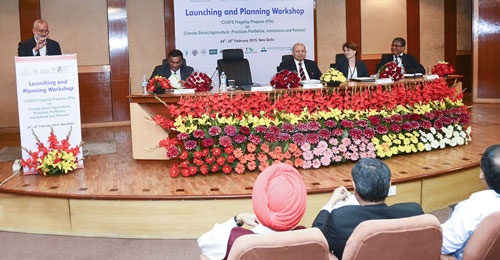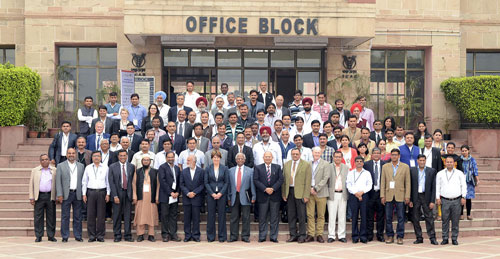Agriculture has the potential to be “part of the solution to reduce the impact of climate change,” according to Dr. R.S. Paroda, Chairman of the Trust for Advancement of Agricultural Sciences, who was one of nearly 100 participants at a launching and planning workshop for Flagship Projects on climate-smart agriculture of the CGIAR Research Program on Climate Change, Agriculture, and Food Security (CCAFS). Held on 24-25 February in New Delhi, the event was jointly organized by CIMMYT and the International Food Policy Research Institute (IFPRI), with participants from Bangladesh, India, Nepal and other partnering countries.

In the fight against climate change, agriculture is both a perpetrator and a victim. Modern agriculture, food production and distribution are major contributors of greenhouse gases, generating about one-quarter of global emissions. Climate-smart agriculture addresses the interlinked challenges of food security and climate change by sustainably increasing agricultural productivity, building resilience in food-production systems and reducing greenhouse gas emissions in agriculture.
The workshop began with a presentation of CCAFS Flagship Project Portfolios, followed by group discussions on associated farming practices, policy, frameworks and recommendations on partnering with governments and other organizations. Clare Stirling, Senior Scientist with the Global Conservation Agriculture Program at CIMMYT, cited the Center’s success in developing climate-smart villages in India and identified improved access to weather information, crop insurance and technology uptake by farmers as key focus areas.
Innovative business models and open innovation platforms for scaling project outputs across diverse agro-ecosystems were also defined. Md. Jalal Uddin of the Bangladesh Agricultural Research Institute proposed integrating mitigation and adaption measures like the promotion of renewable energy, environment management systems, climate change trusts and resilience funds with CCAFS initiatives.

A final session on synergies and convergence opportunities covered topics such as contingency crop plans, weather-based index insurance and resilient technologies, all of which can be implemented in climate-smart villages. CIMMYT scientists P.H. Zaidi, Senior Maize Physiologist and Mahesh Gathala, Scientist and Cropping Systems Agronomist, outlined CIMMYT initiatives that support climate-smart agriculture, such as long-standing research on stress-resilient maize and sustainable cropping systems. Kaushik Majumdar, Director of the South Asia Program at the International Plant Nutrition Institute, and M.L. Jat, Senior Scientist with CIMMYT’s Global Conservation Agriculture Program, discussed initiatives to develop and disseminate climate-smart nutrient management tools and techniques for smallholder farming.
“The CCAFS workshop set the stage for all CGIAR institutions to collaborate and make climate-smart agriculture a reality,” said Jat.
 Capacity development
Capacity development 
